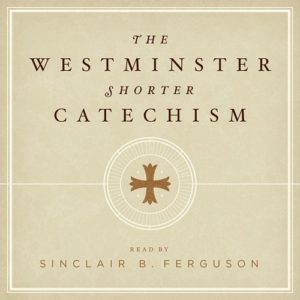6. Catechise to keep core doctrines central.
Catechisms are not only a hedge against heresy; they are also a wedge that opens the mind to truth, the great truths, the main truths of the Bible. What God has made most central and repeated in His Word is what we want to be most central in our faith and in our life together as a church. Otherwise, we can easily be sidetracked and preoccupied by peripheral doctrines and pet issues and hobby-horses. Catechising is a great way to equip and excite believers about grand truths such as God’s decrees,

the atonement, and the offices of Christ as our Prophet, Priest and King.
7. Catechise to see the unity of the whole Bible.
The more a believer is grounded in the main themes of Scripture, the more he sees the glorious unity of the Bible as coming ultimately from one Divine Author. When you can define and defend major doctrines from both OT and NT texts, you become more assured of the consistency, authority, and power of God’s Word.
8. Catechise to prepare for temptation and suffering.
Times of persecution may come, or confinement to a sick bed, when you cannot always read Scripture. The only doctrines and

truths and promises you may have available are what you’ve stored up by memory. Or times of temptation may assault you in your most vulnerable moments, and you will be forced to choose right or wrong long before you can open your Bible. Your only defence will be the Scriptures and doctrines you have stored up in advance for such battles. One old writer said this to encourage parents to catechise: “If ever your poor infants be driven to wildernesses, to hollow caves, to faggot and fire, or to sorrows of any kind, they will thank God and you that they were well catechised!” This would also apply to Christian students who go off to university: When they are under fire for their faith and facing fierce battles with the sceptics of our day, they will need the strongest possible foundation in biblical doctrine.
9. Catechise to teach logical thinking.
In our age of information overload, logical thinking and coherent reasoning are in short supply. Yet our God is not a God “of confusion”, and He calls us to be mature in our thinking, not fuzzy or unclear (1 Cor. 14:20,33). We are made in the image of this logical God, and He calls us to love Him also “with all our minds” (Matt. 22:37) and to “think on what is…true” (Php. 4:8). Pastors and elders are to set the example for all believers, being able to clearly articulate biblical truth, “to exhort in sound doctrine and refute those who contradict” (Tit. 1:9). A great tool for teaching inductive, logical thinking is the catechism. The question-and-answer method trains children and disciplines all of us to read Scripture more carefully and to think precisely about Christian doctrine.
10. Catechise to unify homes and churches.
Unless we want churches with a shallow unity (around personalities, activities, appeasement, etc.), we will have to work at cultivating a deep, lasting unity around truth. Nothing glues us together more in our marriages, homes, or churches, than shared beliefs and common convictions. Scripture speaks repeatedly about churches having a “one heart, one soul, one mind, one spirit, one voice” kind of spiritual unity that is all too rare (Acts 2:42-47; 5:32; Rom. 15:5-6; Eph. 4:1-6; Php. 1:27). But that kind of deeply knit community becomes more of a reality when we confess one gospel and share together in one common faith and set of core doctrines. 1 Cor. 1:10 mandates that, in our churches, we avoid divisions by thinking and speaking “the same thing”. But that means we must be learning and believing the same thing, and catechisms are a great way to do that. Not only can a common catechism foster unity in churches and homes, but also amongst other churches. It becomes easier to find truly “likeminded” churches when we know which churches take certain biblical truths seriously enough for them and their
children to be catechised in them.

Families are encouraged to use this booklet and learn this catechism as a regular habit at mealtimes or whenever they conduct family worship. We have purposefully tried to preserve most of the original wording of the Shorter Catechism, which was intended for the whole family, not just for children. It uses older English which will stretch all of us at times; but with a little effort, it can be explained and still understood by most, young or old, and the effort will surely be rewarded. For smaller children, parents may want to start by teaching some of the simpler questions, or only a portion of the full answer, and/or some key memory verses (Or there are good mini-catechisms for small kids available as a preliminary step).
Churches may also use this catechism booklet as a teaching tool in a brief regular slot during small groups, Bible Hour (Sunday

School) classes, and worship services. Once older children and adults have memorised all the answers and key Scriptures, they can start over again and work on memorising additional Scriptures that support each answer. In our home, our younger children recite the initial answers, followed by our older children then reciting the key supporting verse.
My wife and I grew up in churches unfamiliar with catechisms. Yet we praise God for the seeds that were sown by parents and pastors that revered and modelled God’s Word, as well as a love for church history. This eventually led us to rediscover the catechism as a great tool for passing on the heritage of sound doctrine to the next generation. Sincere believers are in for a surprise when they begin to study the Shorter Catechism. You will soon find you are inhaling a very different kind of air from today’s Christianity. Instead of clichés and shallow phrases, you’ll find sentences pulsating with life and truth in every word. What a joy to stand with centuries of our Protestant forefathers and heroes of the faith in rehearsing again the great truths of the gospel, the heartbeat of our home and church life, and the best comforts for our souls!
 – Tim Cantrell, President and Professor of Systematic Theology, Shepherds’ Seminary Africa
– Tim Cantrell, President and Professor of Systematic Theology, Shepherds’ Seminary Africa
 the atonement, and the offices of Christ as our Prophet, Priest and King.
the atonement, and the offices of Christ as our Prophet, Priest and King. truths and promises you may have available are what you’ve stored up by memory. Or times of temptation may assault you in your most vulnerable moments, and you will be forced to choose right or wrong long before you can open your Bible. Your only defence will be the Scriptures and doctrines you have stored up in advance for such battles. One old writer said this to encourage parents to catechise: “If ever your poor infants be driven to wildernesses, to hollow caves, to faggot and fire, or to sorrows of any kind, they will thank God and you that they were well catechised!” This would also apply to Christian students who go off to university: When they are under fire for their faith and facing fierce battles with the sceptics of our day, they will need the strongest possible foundation in biblical doctrine.
truths and promises you may have available are what you’ve stored up by memory. Or times of temptation may assault you in your most vulnerable moments, and you will be forced to choose right or wrong long before you can open your Bible. Your only defence will be the Scriptures and doctrines you have stored up in advance for such battles. One old writer said this to encourage parents to catechise: “If ever your poor infants be driven to wildernesses, to hollow caves, to faggot and fire, or to sorrows of any kind, they will thank God and you that they were well catechised!” This would also apply to Christian students who go off to university: When they are under fire for their faith and facing fierce battles with the sceptics of our day, they will need the strongest possible foundation in biblical doctrine.

 School) classes, and worship services. Once older children and adults have memorised all the answers and key Scriptures, they can start over again and work on memorising additional Scriptures that support each answer. In our home, our younger children recite the initial answers, followed by our older children then reciting the key supporting verse.
School) classes, and worship services. Once older children and adults have memorised all the answers and key Scriptures, they can start over again and work on memorising additional Scriptures that support each answer. In our home, our younger children recite the initial answers, followed by our older children then reciting the key supporting verse. – Tim Cantrell, President and Professor of Systematic Theology, Shepherds’ Seminary Africa
– Tim Cantrell, President and Professor of Systematic Theology, Shepherds’ Seminary Africa
